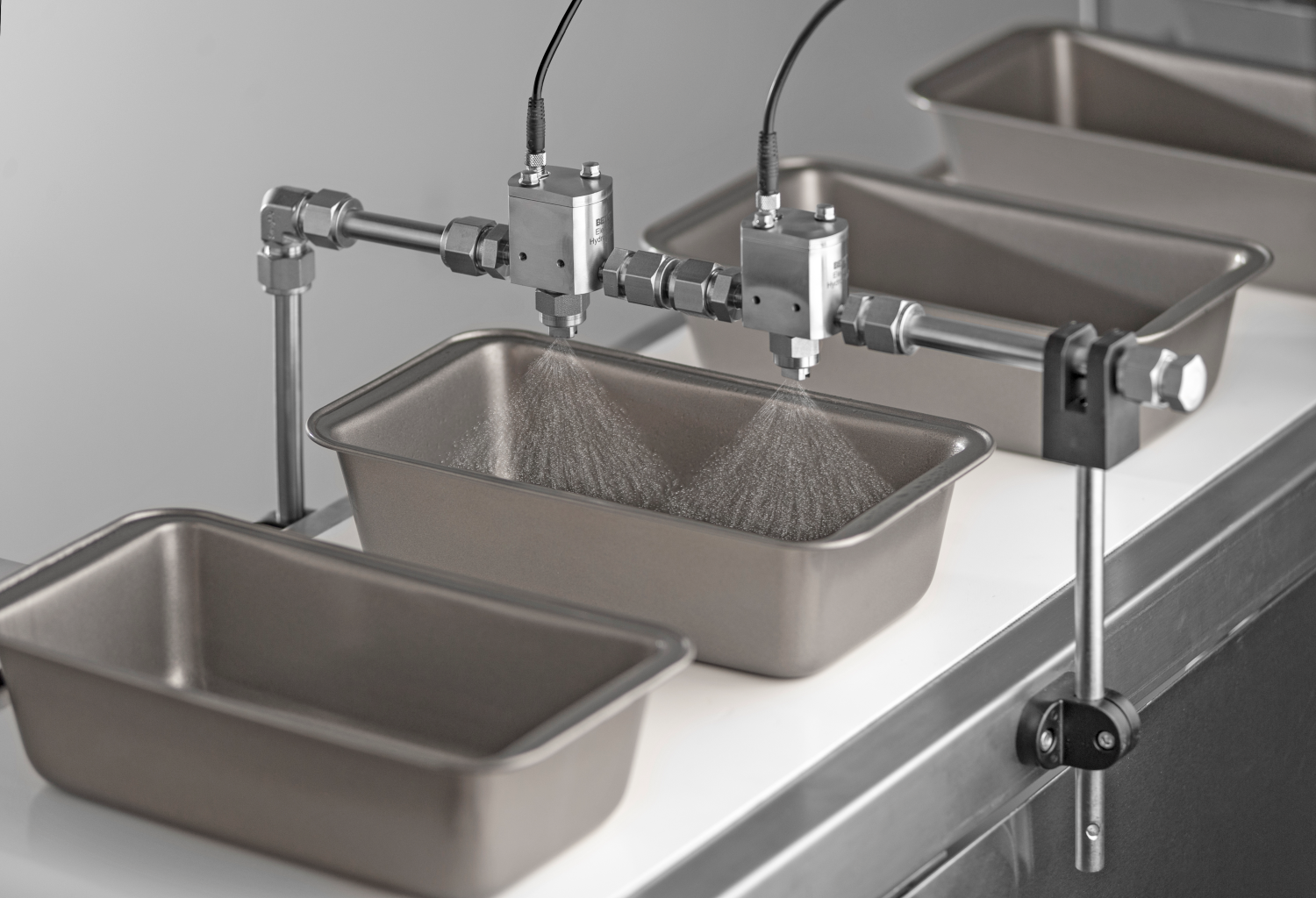SNP is delighted to announce the launch of its new electric HydroPulse spray nozzles for PRECISION SPRAYING IN FOOD & INDUSTRIAL APPLICATIONS
Eliminating waste is an important objective in processing / manufacturing environments and this is where the Electric HydroPulse® spray nozzle comes into its own, ensuring that precise volumes of ingredients and compounds can be sprayed directly onto a processing target, with overspray waste virtually eliminated. Combined with our FlexFlow™ Precision Spray Control System, uniform and consistent coverage can be achieved, even when conveyor speeds need to be adjusted.
How do they work?
The nozzles do not require a compressed air source and are capable of cycling on/off up to 150 cycles per second. This enables the option of using high-frequency cycling known as Pulse Width Modulation (PWM) to vary the liquid spray flow rate at a constant supply pressure with little change in spray performance by adjusting the duty cycle. When the spray cycles at a high enough frequency, coverage uniformity is maintained because the duration between pulses is short enough to ensure there are no gaps in spray coverage.
 EHP nozzle for precision food spraying
EHP nozzle for precision food spraying
 EHPi for precision industrial spraying
EHPi for precision industrial spraying
HydroPulse stainless steel electric spray nozzles are available in two main options:
EHP - a hygienic food grade design, with 1/8”, NPT, BSPT and ½” tri-clamp connections and provide a maximum liquid flow rate of 3.8 litres / min, maximum pressure of 17 Bar and a maximum cycle frequency up to 150 cycles / sec.
EHPi - an industrial design option provides a maximum flow rate of 3.8 litres / min, maximum rated pressure of 20 Bar and a maximum cycle frequency of 50 cycles / sec. This nozzle should be considered whenever high precision spraying is required in non-hygienic applications such as in the spraying of engineering wood and other manufacturing processes.
In addition to the electrically modulated spray nozzles, SNP can also supply the hardware and software for controlling the nozzles. The FlexFlow control panel is an off the shelf box built for precision spray control. Furthermore, we can design and build all the necessary spray manifolds to position the nozzles correctly. When combined the EHP(i) nozzles, the FlexFlow control panel and the spray manifolds represent a complete, precision spraying system.
Benefits of precision spraying with electric nozzles for food applications
Food applications include
• Application of antimicrobial agents for food safety
• Application of preservatives and mold inhibitors to help extend shelf life
• Application of egg wash
• Coat bottles to minimize scuff damage
• Apply water to balance moisture loss from the freezing process
• Apply coatings and release agents to pans, cookie sheets, and conveyors to prevent sticking
• Apply flavorings, oil, and butter to enhance the appearance and improve the taste of products
• Apply viscous coatings like syrups, glazes, and chocolate
When combined with a suitable control system, such as our FlexFlow control panel, electric nozzles can deliver variable flow from the same set of nozzles and give highly accurate spraying even on very fast moving production lines. This often means that wastage or over spraying can be greatly reduced, saving money and improving product quality.
General benefits include:
• Controlling a wide range of flow rates
• Guaranteeing an even and uniform application rate that connects with conveyor line for automated speed adjustments
• Reducing consumption of expensive coatings
• Reducing overspray waste and improve product quality
• Exact targeting of coatings secure a clean and safe environment
• Promoting increased production
• Reducing maintenance and downtime
• Reliable spray dosing provides an accurate calorie count
Benefits of precision spraying with electric nozzles for industrial applications
An example of an industrial application is the production of engineered wood to:
• Apply slack wax, tallow wax or e-wax in the blender
• Add surface moisture before pressing boards
• Apply mixed release agent on mats, cauls, or press belts when using PMDI resins
• Mark nail lines on oriented strand board (OSB)
Benefits include:
• Ensuring precise application and reducing waste
• Integrating tonnage or line speed to maintain uniform coverage when variables change
• Reducing the use of expensive resins, waxes, or release agents by applying the exact volume required
• Applying the optimal amount of surface moisture to increase production by decreasing time in the press
• Enabling confident transitioning to running full polymeric MDI products with non-stick press protection
• Eliminating compressed air from most pre-press and wax operations


